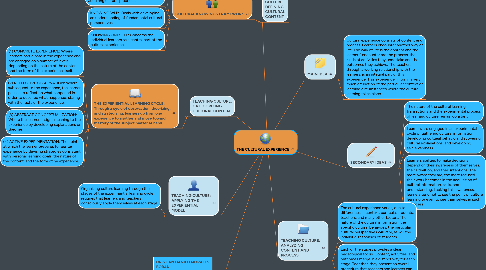THE CULTURAL EXPERIENCE
by Cristian Morales

1. TEACHING CULTURE: DEFINING CULTURAL CONTENT
1.1. CULTURAL KNOWINGS FRAMEWORK
1.1.1. KNOWING ABOUT: Includes all activities that consist of gathering and demonstrating ing acquisition of cultural information.
1.1.2. KNOWING HOW: This interaction involves acquiring cultural practices.
1.1.3. KNOWING WHY: Deals with developing an understanding of fundamental cultural perspectives.
1.1.4. KNOWING ONESELF: Concerns the individual learners as a central part of the cultural experience.
2. TEACHING CULTURE: CATEGORIZING CULTURAL CONTENT
2.1. THE EXPERIENTIAL LEARNING CYCLE: Through a cycle of observation, theorizing, and strategizing, learners go from one experience to another and move toward mastery of the subject matter at hand.
2.1.1. (1) CONCRETE EXPERIENCE: Where learners participate in the experience and are engaged on a number of levels depending on the nature of the content and the form of the experience itself.
2.1.2. (2) REFLECTIVE OBSERVATION: Where, subsequent to the experience, the learner pauses to reflect on what happened in order to describe what happened, staring with the facts of the experience.
2.1.3. (3) ABSTRACT CONCEPTUALIZATION: Where the learner assigns meaning to the experience by developing explanations or theories.
2.1.4. (4) ACTIVE EXPERIMENTATION: The point at which the learner prepares to reenter experience by devising strategies consistent with personal learning goals, the nature of the content, and the form ot he experience.
3. TEACHING CULTURE: APPLYING THE EXPERIENTIAL MODEL
3.1. Organizing culture learning through the stages of the experimential learning cycle requires that learners and teachers consciously apply themselves at each stage.
4. CRISTIAN DANILO MORALES BORJA 20181265023 LANGUAGE, SOCIETY, AND CULTURAL IDENTITY PROFESSOR OSCAR REYES
5. MAIN IDEA
5.1. Cultural experience consists of content and process. Learners encounter another way of life. The way of life is the content and the learners' encounter are the process, the kinds of activities they undertake and the outcomes they achieve. The teacher, through a working relationship with the learners, is an integral part of this experience. This experience, in turn, is very much a function of the particular context or learning circumstances where the culture learning takes place.
6. SECONDARY IDEAS
6.1. The nature of the cultural learning transactions and the experimental process of learning culture remain constant.
6.2. Learners are engaged in an experimental cycle of gathering cultural information, developing cultueal behaviors, discovering cultural explanations, and developing self-awareness.
6.3. Learners abilities to make decisions depend on their awareness of themselves, their situaltion, and their intentions. The more aware they are, the more focused their work becomes in the acquisition of cultural information, skills, and understanding. Lacking this awareness, learners tend not to see the point of culture learning or even to see themselves in such a process.
7. TEACHING CULTURE: ANALYZING CONTENT AND PROCESS
7.1. The cultural experience varies, due to differences in context, curricula, students, teachers, and many other factors. The nature of the cultural information, the specific cultural behaviors, the particular cultural perspectives will vary, as will the individual responses of students.
7.2. Each of the stages provides a clear pedagogical focus. Content, activities, and outcomes merge in a distinct way for each stage. Together, they present an overall procedure that teachers and learners can use to work on the cultural experience.

